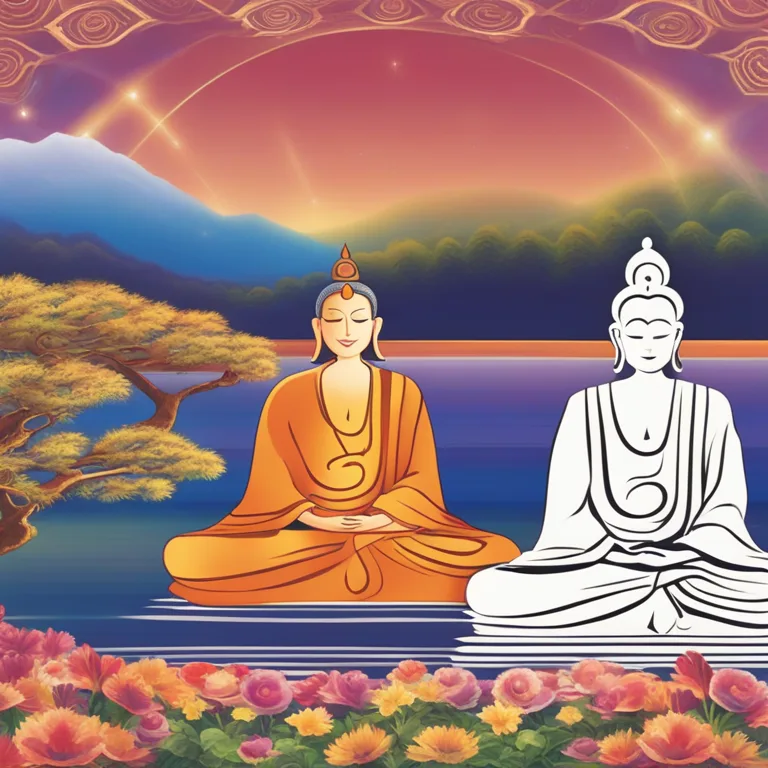
Simple Meditation Techniques Unlocked
Discover gentle practices for achieving inner peace through quiet meditation techniques tailored for tranquility in a bustling world.
article by Hina Kurosawa
Introduction to Quiet Meditation
In the tumultuous stream of life that is the 21st century, finding tranquil moments is essential for mental balance. Quiet meditation offers a sanctuary from the storm. This timeless practice, rooted in ancient traditions, is now backed by modern research celebrating its benefits for stress relief, emotional well-being, and cognitive health. Every meditator's journey begins with a single breath, an invitation to step into a world of peaceful introspection away from the chaotic roar of daily life.

The Breath as a Gateway
Central to various meditation techniques is the art of focusing on the breath. This natural rhythm, the inhale and exhale, serves as a primeval metronome for our existence. To start, find a comfortable seated position and close your eyes. Turn your attention to your breathing, noting the sensations of air moving in and out of your nostrils. As you do so, let distractions fade, centering your consciousness on each breath, letting it guide you to a state of calm.

Guided Visualizations
Guided visualizations are a profound way to harness the power of imagination for relaxation. By picturing a peaceful scene—perhaps a serene beach or a lush forest clearing—you allow your mind to escape the confines of the present moment. Engaging all senses in this mental image deepens the experience, from the sound of waves to the scent of pine. This method can be particularly effective when paired with recordings from meditation apps or playlists that are current and relevant in 2024.

Mantra Meditation
Mantras, hailing from ancient spiritual traditions, are short, powerful sounds or phrases repeated to aid concentration in meditation. Choose a mantra that resonates with you, whether it be a word like "peace" or a more traditional Sanskrit phrase like "Om." With gentle repetition, the mantra becomes an auditory anchor, helping to still your mind and heart. In our interconnected era, mantras also transcend cultural boundaries, reflecting a universal quest for inner serenity.

Mindful Body Scanning
Body scanning cultivates mindfulness by directing attention to different areas of the body. Start at your toes and slowly work your way up, noticing any sensations, tensions, or discomfort without judgment. Acknowledge these feelings and then envision them melting away with each exhalation. This practice fosters a deep connection between mind and body, enabling practitioners to become attuned to the subtleties of their physical state, thereby enhancing overall well-being.
Pauses in Nature
Meditation need not always be seated or still. Taking mindful walks, especially in natural environments, encourages a form of dynamic meditation. With each step, be fully present, observing the details around you—the texture of the path, the variety of greenery, the pattern of bird calls. In 2024, as the need for eco-therapy becomes more recognized, these mindful nature pauses become ever more valuable for urban dwellers seeking respite.
Integrating Meditation into Daily Life
Encouraging a seamless blend of meditation into daily activities can magnify its impact on your life. Simple actions, like sipping tea mindfully or taking deep, intentional breaths during breaks, can be forms of meditation. By integrating these quiet moments throughout your day, the line between meditation and daily life blurs, promoting a sustained sense of peace that endures beyond the meditation cushion.
Published: 1/8/2024
Modified: 1/8/2024
More predictions
Come back here soon to learn more about yourself and your future


Mastering Japa Meditation Practices
Discover the serene art of Japa Meditation and elevate your spiritual journey through chanting and mindfulness.


Jain Meditation Techniques for Inner Peace
Discover the serenity and spiritual depth of Jain meditation practices in a comprehensive article tailored for modern seekers.


Meditation Techniques to Soothe OCD
Discover meditation practices designed to help manage OCD symptoms through mindful awareness and relaxation.